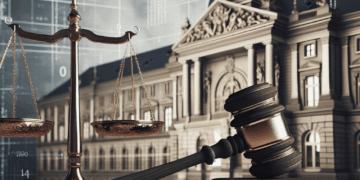No products in the cart.
The Data Protection Conference (DSK), officially the “Conference of Independent Federal and State Data Protection Supervisory Authorities”, is the central body for the coordination and cooperation of data protection authorities in Germany. It plays a decisive role in the interpretation and enforcement of data protection law at national level.
Key Facts
- The Data Protection Conference(DSK) coordinates and cooperates with data protection authorities in Germany.
- Members consist of the Federal Commissioner and the data protection commissioners of the 16 federal states.
- Its main tasks include the harmonization of data protection law and public relations work on data protection issues.
- Key topics include digitalization, artificial intelligence and cyber security.
- The DSK promotes international cooperation and represents German interests in EU bodies.
- Challenges include the federal structure and adapting to technological developments.
- The DSK offers guidance and position papers for companies and citizens.
Composition and organization
1. members: Federal Commissioner for Data Protection and Freedom of Information and the data protection officers of the 16 federal states
2nd Chair: Rotates annually between the members
3. meetings: As a rule three times a year, more frequently if required
4. working groups: Topic-specific subgroups for detailed specialist work
Tasks and functions
1. harmonization: promotion of uniform application of data protection law in Germany
2. opinions: Development of joint positions on data protection issues
3. legislative advice: advising legislative bodies on data protection issues
4. public relations: informing the public about important data protection issues
5. international cooperation: representation of German interests in European and international data protection bodies
Legal basis
1. the Federal Data Protection Act (BDSG)
2. state data protection laws
3. the General Data Protection Regulation (GDPR)
4. rules of procedure of the DSK
Significance for practice
1. guidance: Publication of guidelines and recommendations for action
2. interpretation of the law: Clarification of undefined legal terms and questions of interpretation
3. influence on corporate practice: indirect control through position papers and resolutions
4. political signal effect: statements on current developments in data protection law
Current key topics
1. digitalization: data protection aspects of the digital transformation
2. artificial intelligence: ethical and legal issues in the use of AI
3. international data transfers: effects of the Schrems II ruling
4. cyber security: protection of personal data from cyber attacks
5. data protection in the corona pandemic: evaluation of tracking apps and proof of vaccination
Challenges and points of criticism
1. federal structure: potential differences in interpretation between federal states
2. resources: coping with the increasing complexity and volume of data protection issues
3. technological development: adaptation to rapid technological changes
4. international dimension: coordination with European and global data protection regimes
Cooperation with other institutions
1. the European Data Protection Board (EDPB): representation of German positions at EU level
2 Federal Office for Information Security (BSI): Cooperation on IT security issues
3. consumer protection organizations: Exchange on consumer-relevant data protection topics
4. business associations: dialog with the business community on practical implementation issues
Future prospects
1. greater harmonization: efforts to achieve even more uniform application of the law in Germany
2. digital sovereignty: promotion of data protection-friendly technologies and standards
3. international cooperation: increased cooperation on cross-border data protection issues
4. educational initiative: increasing data protection literacy among the population
Conclusion
The Data Protection Conference plays a central role in the German data protection landscape. It contributes significantly to the harmonization and further development of data protection law in Germany and provides guidance for companies, authorities and citizens. In view of the rapid pace of technological development and the increasing importance of data protection in a digitalized world, the role of the DSK as a coordinating and guiding authority will continue to grow in importance. The challenge is to find a balance between the uniform application of the law, technological innovation and the protection of fundamental rights.





















